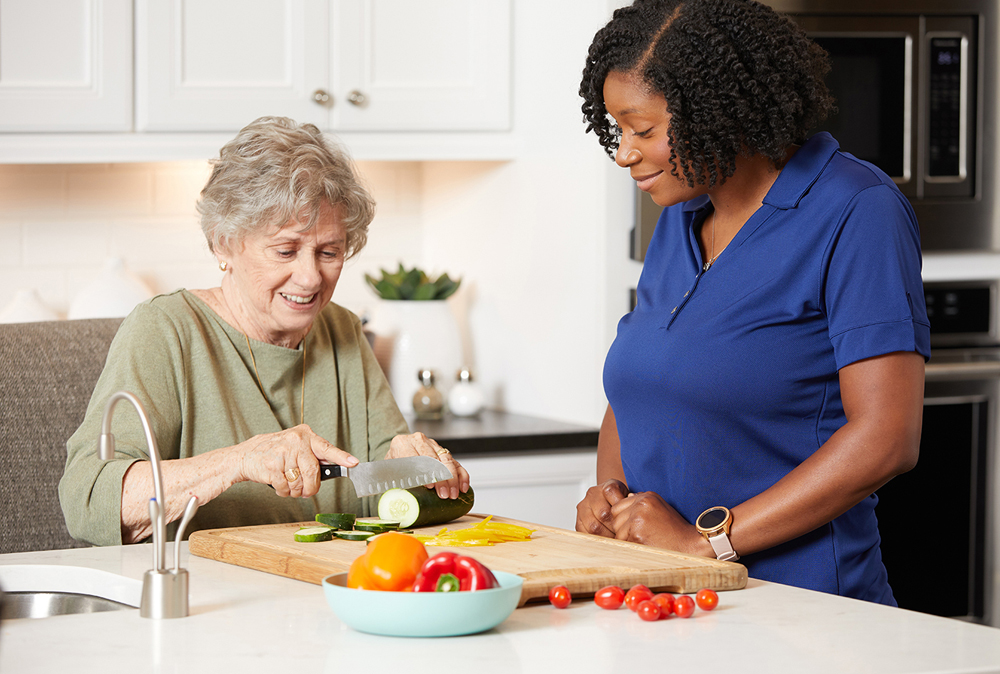Good nutrition and hydration are important at any age, but this is especially true for the older generation. Maintaining a healthy diet and staying properly hydrated can help you increase your energy levels, control your weight and may even prevent certain health problems such as heart disease, high blood pressure, type 2 diabetes and osteoporosis.
Understanding what a well-balanced diet looks like is vital for staying healthy throughout all of life. Here you can learn more about the importance of nutrition and hydration including tips on how you can maintain a healthy diet as you get older.
WHY IS NUTRITION IMPORTANT?
What we eat plays a large role in how we feel, regardless of our age. Our bodies rely on the proteins, carbohydrates and healthy fats in food for fuel and energy throughout the day. For our bodies to thrive, these nutrients must be replaced daily. It is also important to ensure you’re getting enough macronutrients such as vitamins and minerals.
Most of us know that proper nutrition and diet can help maintain a healthy weight, but there are many other benefits as well. People with healthy eating patterns live longer and have a lower risk of many chronic diseases such as heart disease and diabetes. Good nutrition may even prevent colds and infections.
Although the exact cause of Parkinson’s is unknown, it is currently believed that Parkinson’s is the result of genetic and environmental factors.
THE SIGNS OF INADEQUATE NUTRITION
Nutrient deficiencies and malnutrition can lead to a variety of health concerns. If you suspect malnutrition in an older relative, watch for these signs:
- Unexplained fatigue
- Getting sick often
- Bruised or dry, cracked skin
- Wounds that are slow to heal
- Ridged or spoon-shaped nails
- Trouble chewing or swallowing
- Loss of appetite
- Weight loss
- Muscle weakness
WHAT DOES A WELL-BALANCED DIET LOOK LIKE?
The NHS provides an excellent Eatwell Guide which explains how much of what we eat should come from each food group to achieve a healthy, balanced diet.
The Eatwell Guide divides the foods we eat and drink into 5 main food groups. Look over the guide and try to choose a variety of different foods from each of the groups throughout the day. This will help you get the wide range of nutrients your body needs to stay healthy.
If you’re looking for more guidance, the NHS also offers plenty of tips and advice on proper nutrition and hydration, including how to eat a balanced diet.
Older adults need to ensure they are including the following in their diets:
- Calcium and vitamin D. Adults over 70 need more calcium and vitamin D than they did in their younger years. Choose a variety of calcium-rich foods and beverages and aim to eat three servings of low-fat or fat-free dairy products every day. Sources of vitamin D include fatty fish, such as salmon, eggs and fortified foods and beverages.
- Vitamin B12. Some adults over 50 have problems absorbing vitamin B12, which can lead to nutrient deficiencies. Fortified cereal, lean meat and fish and seafood are good sources of vitamin B12. Your GP or nutritionist may also recommend a B12 supplement.
- Dietary fibre. Constipation is a common problem amongst older adults and eating plenty of fibre can help you stay regular. Foods such as whole-grain bread, cereals, lentils, beans, peas, whole vegetables, and fruit can provide dietary fibre.
- Potassium. Having enough potassium in your diet may help prevent high blood pressure, kidney stones and osteoporosis. Sources of potassium include beans, vegetables, fruits, and fat-free or low-fat dairy products.
- Omega-3 fatty acids. Studies have shown that omega-3 fatty acids can lower heart disease risk factors like high blood pressure and triglycerides. Good sources of omega-3 fatty acids are vegetable oils, seeds, nuts, avocados, and fish.
WHY IS HYDRATION IMPORTANT?
The human body is made up of over 60% water and every cell, organ and tissue in your body relies on water to survive.
Drinking enough water each day is important for many reasons: it can help regulate your body temperature, prevent infections, keep your joints well lubricated and ensure important organs like your brain and heart are functioning properly. Being adequately hydrated can even boost your mood and improve your sleep quality.
People 65 years and older are at increased risk of heat-related illnesses, such as dehydration. This is because as we age our bodies lose more fluids than normal through sweat. An ageing body won’t automatically adjust this rate of sweat loss to prevent dehydration as it does when we are younger.
Conventional wisdom tells us that we should consume 8 glasses of water a day or about 2 litres, but this number is dependent on your age, body size, activity levels and other environmental factors. Consider discussing your hydration with your GP to determine your requirements.
TIPS FOR EATING AND DRINKING WELL
- Eat at least 5 portions of fruits and vegetables. Try and include a variety of different colours and types each day.
- Eat plenty of whole grains. At least half of the cereals, breads, crackers and pasta you eat throughout the day should be made from whole grains.
- Choose lean meats. Lean meats are lower in calories while still providing heart-healthy protein and fats.
- Try other protein sources. Try replacing your usual meats with other protein sources such as fish, eggs, beans or tofu.
- Season with herbs and spices. This can help you add flavour to your meals without relying on salt.
- Choose low-fat or fat-free milk. They will provide the calcium and vitamin D your bones need without excessive fat or calories.
- Make meals for social events. Visit your loved one at meal times or encourage them to join programs and community events where they can dine with others.
- Keep water easily accessible. Try keeping a water bottle or jug near your favourite seat.
- Set up a series of alerts or reminders on digital devices. This can help an older adult remember when it is time to have a meal or drink a glass of water.
SOLUTIONS FOR COMMON EATING PROBLEMS AS WE AGE
As we age, many people lose interest in eating or cooking. These small changes can help you overcome such challenges to ensure you are getting the proper nutrition and hydration from your diet.
- Food no longer tastes good. If food is no longer tasting as good as it once did, try cooking new recipes or adding different spices to reinvigorate your taste buds. Some medications can also affect your appetite or taste so consider discussing this with your GP.
- Difficulty chewing. Try softer foods such as cooked vegetables, canned fruit, beans, eggs and applesauce. If you are experiencing pain in your gums or teeth, share these concerns with your dentist or GP.
- Poor digestion. If poor digestion is keeping you from eating a well-balanced diet, speak to your GP. They can rule out any underlying conditions and help you figure out what foods to eat while still maintaining a healthy diet.
- Living alone. As we age, we may unexpectedly find ourselves living alone. This can make it difficult to cook healthy meals or go grocery shopping. If you are finding it difficult to keep up with a healthy diet or proper hydration, ask a family member for help or consider hiring a dedicated home carer.
EXPERT HOME CARE, FOR ALL OF LIFE
Making sure an older loved one gets the proper nutrition and hydration they need can be a challenging and ongoing task. If you feel that your ageing loved one could use extra support with their nutritional, physical or emotional needs, our expert home care service can help.
For over 75 years, Prestige Nursing & Care has been trusted by our clients and their families to provide competent and compassionate care at home. Our dedicated carers are there to assist our clients in living an active lifestyle and eating a nutrient-rich diet that promotes good health.
We can be there throughout the whole decision-making, food shopping, meal preparation and eating process. Our carers provide one-to-one personal care and attention while proactively watching for any signs of malnutrition or dehydration.
Find out why our clients choose Prestige Nursing & Care for a high quality, responsive home care service.

